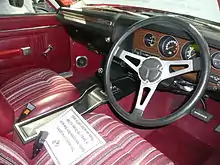Fascia (car)
Fascia (/ˈfeɪʃə/) is a term used in two areas in the automotive world.

Fascia often refers to the decorative panels of a car's dashboard,[1] or the dashboard assembly.[2][3]
Regulations affecting bumper design in the late 1970s saw the increasing use of soft plastic materials on the front and rear of vehicles. Fascia was adopted then as the term to describe these soft areas,[4] but is now increasingly used as a general term for a car's set of front-end components: grille, headlamps, front bumper, and other details.[5]
A bumper valance panel, a piece that is mounted on top of the bumper, or is right under it, is also considered a part of the vehicle's fascia. Carmakers often design the body panels that form the nose of their vehicles to have a unified look across their model line (see the ‘shark’ grille by Mitsubishi, or ‘tiger-nose’ grille by Kia[6]).
The word comes from the Italian word fascia (pronounced [ˈfaʃʃa]), t meaning stripe.
References
- "1972 Mercury Cougar XR-7 Advertisement". Life. Time Inc. 71 (14): 19. 1 October 1971. ISSN 0024-3019.
Also standard is the sweep of instrumentation set into a fascia that glistens with the look of cherry woodgrain.
- "The dangers of sloping windscreens". New Scientist. Reed Business Information. 75 (1059): 7. 7 July 1977. ISSN 0262-4079.
- "Comfort the keynote of the Vauxhall Wyvern". The Times. London. 29 January 1957. p. 2.
There is a large cupboard in the centre of the fascia
- Lamm, Michael (October 1979). "Driving the 1980 Dodge, Plymouth and Chrysler Models". Popular Mechanics. Hearst Magazines. 152 (4): 246. ISSN 0032-4558.
The 1980 Cordoba, meanwhile, keeps its more traditional front-end ensemble, with an upright grille and metal bumper. It too, uses a soft fascia, even so.
- Berkowitz, Justin (January 2013). "2014 Chevrolet Malibu Spy Photos". Car and Driver. Retrieved 19 January 2013.
- "THE PASSION THAT LED TO THE ALL-NEW KIA STINGER". kia.com.